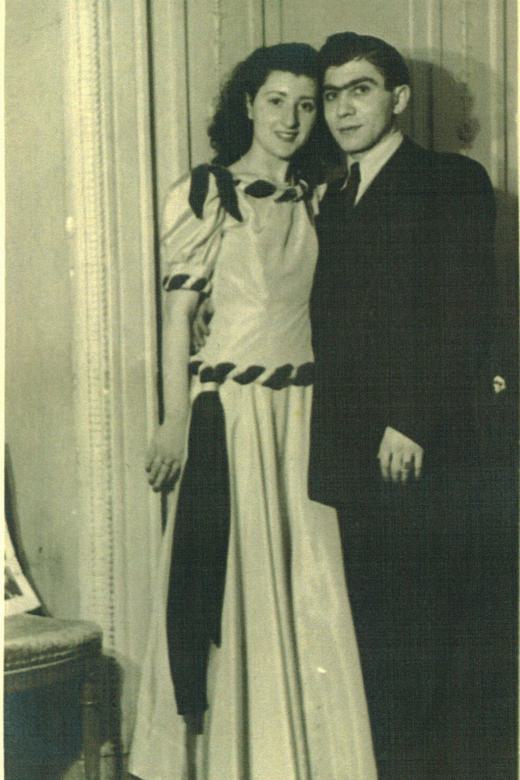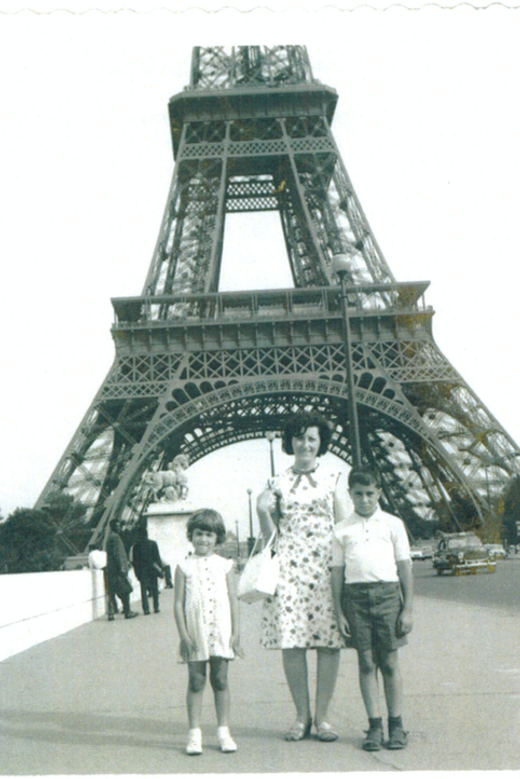Berthe Cygelfarb (née Pesses)
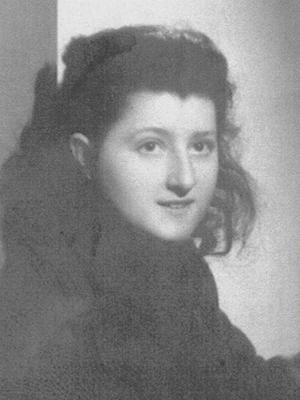
Born: Brussels, Belgium, 1931
Wartime experience: Hiding in towns and villages in France
Writing partner: Chris Dingman
Berthe Cygelfarb (née Pesses) was born in Brussels, Belgium, in 1931. Her family moved to Paris, France, in 1933, where her younger brother, Albert, was born.
In 1942, after living under German occupation for two years, Berthe’s father was deported and Berthe, her mother and her brother fled Paris to go into hiding. Through the organization Œuvre de secours aux enfants (Children’s Relief Agency) Berthe and her brother were hidden with non-Jewish families in towns and villages in France, separated from their mother. After France was liberated in 1944, Berthe lived in children’s homes in France and then in Paris with her mother and brother. Her father never returned. In 1950, Berthe married Wolf (Welwel) Cygelfarb in Paris, and they immigrated to Canada later that year. In Toronto, Berthe raised a family and worked in clothing factories, later taking university courses and working in real estate until her retirement. Berthe has told her story of survival to numerous audiences.
My brother and I say we had an honourable mother. Thanks to her, Albert and I are alive. She had a lot of courage. I don’t know how, but she knew exactly what to do. She didn’t cry or feel sorry for herself — no — she always found a solution to the problem. Somehow, my mother also seemed to know what would happen before it happened. She could almost feel it.
Leaving Paris
We left Paris and our apartment to go into hiding. That evening, we took the train to Ablon-sur-Seine near Villeneuve-Saint-Georges to a pension, a hotel, run by two women who had a big dog. A few days later, my mother went back to our old apartment and saw it had been completely emptied. All she found were a few pictures on the floor. We didn’t know whether to blame the police, the landlady or our neighbours — we’ll never know.
We stayed in Ablon for two or three weeks. One day, my mother took me back to Paris, to the office of the Œuvre de secours aux enfants (OSE; Children’s Relief Agency) on Rue des Francs-Bourgeois, to ask for their help to hide us. The OSE was started in 1912 in Russia. It was founded by Jews from Europe and America to help poor kids who were victims of the pogroms in Eastern Europe. Jews were often the target of pogroms, common in Russia and Eastern Europe, with many children orphaned because of the violence. The OSE paid foster homes to care for the children.
We stayed with Madame Deschamps, an old woman of about seventy who was an antisemite. Not a day went by that she didn’t say awful things about the Jews. She’d say, “The Jews are thieves, the Jews are dirty and the Jews are taking over the world and the Jews…the Jews…the Jews….” I was ashamed to be a Jew. Her hate for the Germans, however, was worse than her hate for the Jews. Madame Deschamps’s husband had died in World War I and she lost a son in World War II.
The maires, mayors, of the villages where we were hidden were members of the Underground and knew we were Jewish. Because we were in hiding, we could not register in the towns, which was a requirement in order to receive a ration card. The maires took risks by giving us ration cards, which had tickets that allowed us to buy a ration of coal, textiles and food. At my age, I was classified as a G2; we got 350 grams of bread a day and 180 grams of meat once a month. Milk was only given to children and the elderly. Only saccharin, rutabaga and Jerusalem artichoke, which we used as potatoes, and margarine, were easy to buy. The homes where we were hidden had vegetable gardens and grew potatoes, vegetables and some fruit, which helped but, even so, my teeth were very bad by the end of the war.
Madame Deschamps’s profession was to host the children of rich Parisians and teach them manners. She housed seven children. We were not allowed to play inside Madame Deschamps’s house, so we played in the park during both summer and winter. Madame Deschamps was also paid to keep a girl whose mother was a prostitute, and another two children belonged to a French general who worked with the Germans. He never said anything even though he knew we were Jewish — he knew because he had seen my mother, who had a heavy accent and looked stereotypically Jewish, with her dark skin and hair.
I don’t remember how we knew how to behave in hiding — we just did. My mother used to tell me, “If anyone asks about your brother, tell them that he had an operation when he was small, that he was sick, that they had to operate on him.” I did not know about circumcision back then.
We went to school quite far from Madame Deschamps’s house. At school, we were checked for lice. Albert was a very good student; he was born to be an academic. One day, on the way to school, someone stopped us and told us to go back to where we came from. We returned to Madame Deschamps’s house, but soon after, we had to leave right away because the principal of the school had been arrested. He was in the Underground and they were scared that he would be tortured and give away the names of the Jewish kids in the school.
It became too dangerous for us to stay at Madame Deschamps’s so a social worker from the OSE organization picked us up to take us back to our mother in Paris. One day, in 1942, a police officer arrested my mother in the metro and asked to see her identity card, which was stamped with the word Juif, Jew. She looked the police officer directly in the eye and said, “You took my husband, and I do not know if he is alive. I have two children. Do you have children? Do you want my children to be orphaned?” He said, “Go to the other side,” and she left.
My brother and I say we had an honourable mother. Thanks to her, Albert and I are alive. She had a lot of courage. I don’t know how, but she knew exactly what to do. She didn’t cry or feel sorry for herself — no — she always found a solution to the problem. Somehow, my mother also seemed to know what would happen before it happened. She could almost feel it. Once, when Albert and I were in hiding, she had planned to come to visit us but she fell asleep. That was the day of a roundup at the train station — thankfully, she missed that train!
After leaving Madame Deschamps’s, my mother took us to Brou to live with Madame Leroux. Brou was a small town of about four thousand people that was southwest of Paris. Madame Leroux and her family were Christian. She was divorced from her husband and had four children. Her youngest, a fourteen-year-old daughter, had just died from meningitis. Her other children, Eliane and Edith, were eighteen or nineteen years old, and Gérard was married and had children. Gérard had escaped from a work camp in Germany, so he was hiding in the attic of his apartment. We were not to tell anyone about Gérard; we had to keep it a secret.
There were a few Jewish families hiding in Brou and many children were in hiding with Christian families. I went to church because I wanted to show that we were not Jewish, that we were Catholic. I became quite religious. I needed something. I don’t remember whether my brother went to church or not, but we both waited at the church while weddings took place because afterward people threw candies. When my mother came to visit, I said, “Mother, I want to do my communion.” She said, “Ça, non” (Oh no, not that), so I didn’t.
We lived a normal life but we were scared, especially about people who collaborated with the Germans and the police. At night I had trouble sleeping because I was always thinking, am I going to see my mother? Where is my father? I used to scratch because of nerves. It was a condition called urticaire, hives. I was always red all over from scratching.
When we were hidden, we could not talk about being Jewish. A lot of kids had false names but we didn’t have to change our name; instead, we pronounced our name without the “s” at the end. That way, our name sounded French. At the time, Albert and I didn’t talk about our experiences during the war. Nor did I speak of it with my friends. We just hid all the time. We were Parisians.
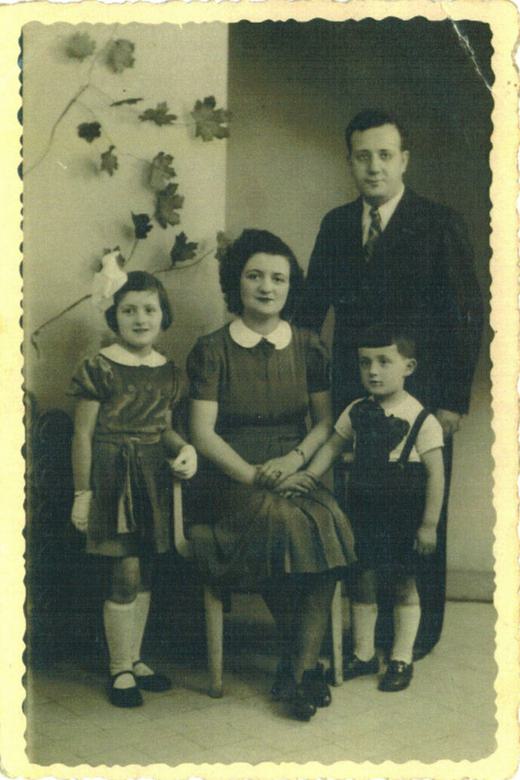
Berthe with her parents, Chana and Israel, and her brother, Albert, before the war. Paris, France, May 1939.
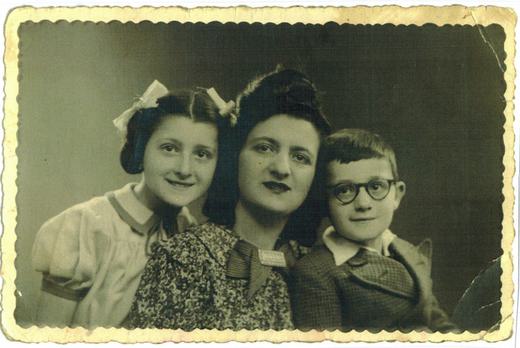
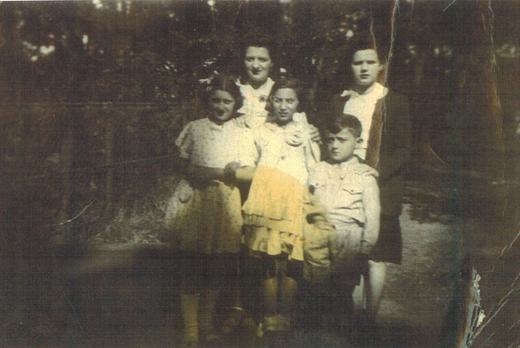
Berthe (front row, left) with her friend Marcel (centre) and brother, Albert, standing in front of Mme Leroux and her daughter Edith. Brou, France, August 1943.
Sharing Experiences of the War
When we were hidden, we couldn’t talk about being Jewish. We didn’t speak with each other about our experiences in the war. Even afterward, we didn’t speak of it. This would only come much later. When I came to Canada and talked about my experiences in the war, I was stopped and told, “Don’t talk about it, you have to forget,” so I stopped talking. It was the same for many Jewish immigrants who had survived the Holocaust.
It was very hard to talk to my mother about her experience in the war because she was in France and I was living in Canada. When I went to France, it was always with the children and I was busy. But one day, my mother said, “As long as I was working and living my life, I never thought of it. But now I’m thinking of all the things that happened in the war and I’m shaking.”
My husband didn’t talk about his experiences, either. It took me fifteen years to learn that he had been in concentration camps. At times, it was very hard for us to live together. We had gone through different things in the war, we came from different cultures and we were both very strong-willed. At the beginning of our marriage, I had a whole set of Limoges china. We broke everything, except for one big bowl, in the first few years of our marriage. He would break a dish, I would break a dish and so on. In spite of these brief moments of temper, we went on to have a happy life together. Welwel was a wonderful and affectionate husband. I knew he would do anything for me.
My husband and I spoke Yiddish to each other because I wanted to learn to speak Yiddish well. Welwel was not religious, nor am I. I celebrate the Jewish holidays because of tradition and because the family should be together — not because of religion. And I went to synagogue for weddings, bar mitzvahs and other special occasions, not for religion. I also go to synagogue for activities, special speakers and conferences.
Once, I told the rabbi, “If you can believe that there was a God, explain how so many millions of people and children died. Where was God?” He said, “I understand.” He never told me that I should believe.
***
I always thought my experiences were nothing because my husband was in concentration camps from 1939 to 1945. He lost all his family, just he and his brother survived; their three sisters and parents died. So I thought my story was not important. I had a lot of hang-ups, and then I read a book about children in the Holocaust and that gave me a lot of things that I could understand about myself. Then in 1990, an organization of hidden children, World Federation of Jewish Child Survivors of the Holocaust and Descendants, was started.
The first meeting was in New York in 1991. I couldn’t go because my husband was very ill and I didn’t want to leave him alone. I went a couple of years later and I learned a lot about myself because everyone tells their story, and by telling your story you find yourself, too. People there told me, “You have suffered also. Not like the ones who went to concentration camps, but you had to hide your identity, you were living in fear, no parents, no house, nothing.” The organization helped me understand why I was behaving oddly. I didn’t understand why before, but when I went to those meetings, I started to understand. Many said, “My mother should have taken me — she abandoned me.” A lot of people, men and women, felt they had been abandoned by their parents, and they were still suffering from that belief.
I never thought that. I thought that our mother saved our lives. I think I was lucky that I didn’t think that way. Even so, I felt guilty for surviving when so many perished. It took me a long time to get rid of that guilt. Even the second generation is traumatized by the Holocaust, because they know there is a story and they are scared to ask.
Shortly after my mother’s death in 1998, I travelled to Paris with my son, Steve, and we visited Passage St. Bernard. I found it to be the same as when I left it during the war. In the corner of the street, in my memory, I saw my father coming back with a police officer to pick up a suitcase of clothes before going to the camps. Each window reminded me of my friends with whom I had played — most of my friends had died in the camps. It was like a ghost following me that day. Now, the old buildings have been destroyed to build a gymnasium and office buildings. Passage St. Bernard is now a pedestrian street.
My family, friends and life have changed me. When I came to Canada, I was very French and I thought that Paris was the centre of the world. I thought only French things were good and that everything else was old-fashioned. As I got older, I started to understand things differently. I love France but I don’t think I would live there.
It has been hard for me to tell my story. The memories were often painful — I have lived my life with a lot of ghosts. I want my story to show that not everything was black and white; there was grey, and there were many different colours. Not everyone was mean. Yes, there were mean people, but there were people who were very nice, too: Madame Leroux and her family; the mayors of the village; and the others I have described. Although in general, the French police collaborated with the Germans, there were some exceptions, like the ones who warned people when there would be a rafle, raid, and gave them time to “pack a suitcase” to escape, the police officer who let my mother escape from the subway, the soldier in the park in Brou and others.
I am grateful to the keepers who risked their lives to hide my brother and me. By living with our keepers, we learned to be good and to please because we were scared they would send us back. If we had been sent back, we wouldn’t have had a roof over our heads because our mother was also in hiding. What would our future have been if we were sent back? What would our destiny have been?
I am proud that, as survivors, Welwel and I never taught our children to hate. They learned to respect all people no matter their religion, race or nationality.
Today, I feel a lot of happiness. I am happy that I have had a long and comfortable life. I am happy to have the love of my family, my extended family and friends. I really enjoy life!
